- Home
- Dan Abnett
Playing Patience
Playing Patience Read online
Warhammer 40,000
It is the 41st millennium. For more than a hundred centuries the Emperor has sat immobile on the Golden Throne of Earth. He is the master of mankind by the will of the gods, and master of a million worlds by the might of his inexhaustible armies. He is a rotting carcass writhing invisibly with power from the Dark Age of Technology. He is the Carrion Lord of the Imperium for whom a thousand souls are sacrificed every day, so that he may never truly die.
Yet even in his deathless state, the Emperor continues his eternal vigilance. Mighty battlefleets cross the daemon-infested miasma of the warp, the only route between distant stars, their way lit by the Astronomican, the psychic manifestation of the Emperor’s will. Vast armies give battle in his name on uncounted worlds. Greatest amongst His soldiers are the Adeptus Astartes, the Space Marines, bio-engineered super-warriors. Their comrades in arms are legion: the Imperial Guard and countless planetary defence forces, the ever-vigilant Inquisition and the tech-priests of the Adeptus Mechanicus to name only a few. But for all their multitudes, they are barely enough to hold off the ever-present threat from aliens, heretics, mutants - and worse.
To be a man in such times is to be one amongst untold billions. It is to live in the cruellest and most bloody regime imaginable. These are the tales of those times. Forget the power of technology and science, for so much has been forgotten, never to be re-learned. Forget the promise of progress and understanding, for in the grim dark future there is only war. There is no peace amongst the stars, only an eternity of carnage and slaughter, and the laughter of thirsting gods.
Playing Patience
I
West of Urbitane, the slum-tracts begin, and one descends into a ragged wilderness of dispiriting ruins where the only signs of life are the armoured manses of the narcobarons, projecting like metal blisters above the endless rubble. This is a destitute realm, a great and shameful urban waste, stalked by the Pennyrakers and the Dolors and a myriad other gangs, where Imperial authority has only the most tenuous grip.
A foetid wind blows through the slum-tracts, exhaled like bad breath from the sumps and stacks of the massive city. This miasmal air whines through the rotting habitats and moans in the shadows.
And those shadows are permanent, for the flanks of Urbitane rise behind the tracts, eclipsing all daylight. Flecked with a billion lamps, the rockcrete stacks of the sweating hive-city ascend into the roiling clouds like the angular shoulders of some behemoth emerging from chthonic depths, and soar as a sheer cliff above the slums that litter the lightless ground at its foot.
Sub-orbitals cross the murky sky, their trace-lights blinking like cursors on a dark screen. Occasionally the slums tremble as a bulk-lifter passes particularly low overhead on its final approach into the canyons of the hive, the bass rumble of its engines shivering the air.
Where, in the west, the hive stacks come tumbling down to meet the slums, shelving like giant staircases in bad repair, there is a patched stonework tower that houses the Kindred Youth Scholam. It is a meagre place, supported by charitable works, teetering on the brink between city and slum. Humble, crumbling, it faces west, its many window-slits barred, for the safety of the pupils.
At the start of of the year 396 Imperial, there were, amongst the scholam’s many inhabitants, three sisters called Prudence, Providence and Patience.
The night I arrived on Sameter, the rigorists had locked Patience in the scholam’s oubliette.
II
Sameter is a dismal place, and its morose air matched our mood. A slovenly, declining agrochemical world in the heartlands of the Helican subsector, it had seen better days.
So had we. My companions and I were weary and dejected. Pain clung to us like a shroud, so tightly none of us could express our grief. It had been that way for six months, since Majeskus. The only thing that kept us together and moved us along was a basic desire for revenge.
We had been forced to make the voyage to Sameter aboard a privately hired transport. the Hinterlight was dry-docked for repairs half a subsector away, and its mistress, Cynia Preest, had pledged to rejoin us as soon as the work was done. But I knew she was rueing the day she had ever agreed to assist my mission. When I had last spoken with her, she had confided, bitterly, that another incident like Majeskus would surely make her break her compact with me and return to the life of a merchant rogue in the Grand Banks.
She blamed me. They all blamed me, and they were damn well right. I had underestimated Molotch. I had given him the opening. My blind confidence had led to the disaster. Throne, what a fool I had been! Molotch was the sort of enemy one should never underestimate. He was Cognitae, perhaps the brightest and best to emerge from that infernal institution, which took genius as a basic prerequisite.
Our lander skimmed down through the filthy air above the Urbitane isthmus, bumping in the crosswind chop, and cycled in towards one of the hive’s private landing gantries on the north side of the city. As the breaking jets fired, sudden, intense gravity hung upon us. Even inside my suspensor field, I felt its weight. I had linked one of my chair’s data cables to the lander’s systems, and so saw everything that the shuttered cabin denied my friends. The looming piles of the hive, the shelf-like stacks, each one kilometres wide, the bristling lights, the smog. Hive towers rose up, as vast and impassive as tombstones, etched with lit windows. Chimneys exhaled skeins of black smoke. The lower airways buzzed with small fliers and ornithopters, like gnats swarming up on a summer evening. There, the spires of the Ecclesiarch Basilica, gilded like a crown; beyond, the huge glass roofs of the Northern Commercia, so high that the clouds of a microclimate weather system had formed beneath their vault. There, the Inner Consul, the radiating rings of the transit system, the wrought-iron pavilions of the Agriculture Guild.
We touched down at sunset. Great, shimmering doughnuts of gas-flame were issuing from the promethium refineries along the isthmus, bellying up like small, fireball suns against the curdled brown undercast.
The private landing gantry was high up in the twisted mass of the inner hive-towers. Leased by the local ordos to provide convenient access to the city, it was a creaking metal platform trembled by the windshear. Even so, exhaust vapour from our dented, scabby lander pooled in an acrid haze inside the rusting safety basket of the pad. The lander, a gross-utility vehicle three hundred years old, reclined on its pneumatic landing claws like a tailless lizard. It had been painted red, a long time ago, but the colour was only a memory now. Steam hissed from the rapidly cooling hydraulics, and a disturbing quantity of lubricant and system fluid gushed out of its underside from joints and cracks and fissures.
Without asking, Kara Swole took hold of my chair’s handle and pushed me out down the open ramp. I could have done it myself but I sensed that Kara, like all of them, wanted something to do, just to keep busy. Harlon Nayl followed us out, and walked to the edge of the safety cage to stare out into the foggy depths of the hive. Carl Thonius lingered in the hatchway, paying the pilot his fee and tip and making arrangements for future services. Harlon and Kara were both dressed in bodygloves and heavy jackets, but Carl Thonius was, as ever, clad in exquisite, fashionable garments: buckled wedge shoes, black velvet pantaloons, a tailored jacket of grey damask tight around his thin ribs, a high collar tied with a silk bow and set with a golden pin. He was twenty-four years old, blond-haired, rather plain of face, but striking in his poise and manners. I had thought him too much of a dandy when the ordos first submitted him as a possible interrogator, but had quickly realised that behind the foppish, mannered exterior lay a quite brilliant analytical mind. His rank marked him out amongst my retainers. The others – Nayl and Kara, for example – were individuals I hired because of their skills and talents. But Carl was an inquisitor in training. One day
, he would aspire to the office and signet of the sublime ordos. His service to me, as interrogator, was his apprenticeship, and every inquisitor took on at least one interrogator, training them for the duty ahead. I had been Gregor Eisenhorn’s interrogator, and had learned an immeasurable amount from that great man. I had no doubt that, in a few years, Carl Thonius would be well on his way to that distinguished rank.
Of course, for reasons I could not have ever imagined, that would not be the case. Hindsight is a worthless toy.
Wystan Frauka emerged from the lander, lighting his latest lho-stick from the stub of the last. He had his limiter turned on, of course, and it would remain on until I told him otherwise. He looked bored, as usual, detached. He wandered over to where a servitor was unloading our luggage from the lander’s aft belly-hatch and looked for his own belongings.
Harlon remained at the edge of the safety cage, deep in thought. A heavyset man, thick with corded muscle, his head shaved, he had a dominating presence. Born on Loki, he’d been a bounty-hunter for many years before gaining employment with my mentor Eisenhorn because of his skills. I had inherited him, so to speak. There was no man I would rather have at my side in a fight. But I wondered if Harlon Nayl was at my side any more. Not since… the event. I’d heard him talk about ‘going back to the old game’, his defeated tone the same as Cynia Preest’s. If it came down to it, I would let him go.
But I would miss him.
Kara Swole trundled me over to the gantry edge until we were facing the safety basket too. We stared out across the city.
‘See anything you like?’ she asked. She was trying to be light and funny, but I could taste the pain in her voice.
‘We’ll find something here, I promise,’ I said, my voice synthesised, expressionless, through the mechanical vox-ponder built into my support chair. I hadn’t mind-talked to any of them for a long time now, not since Majeskus, probably. I despised the vox-ponder’s menacing flatness, but telepathy seemed too intimate, too intrusive at a time when thoughts were raw and private.
‘We’ll find something here,’ I repeated. ‘Something worth finding.’
Kara managed a smile. It was the first I had seen her shape for months, and it warmed me briefly. She was trying. Kara Swole was a short, voluptuous redhead whose rounded build quite belied her acrobatic abilities. Like Harlon, I had inherited her from Eisenhorn. She was a true servant of the ordos, as hard as stone when she needed to be, but she possessed a gentleness as appealing and soft as her curves. For all her dexterity, her stealth, her confidence with weapons, I think it was that gentleness that I most valued her for.
Molotch had faded into the void after his crimes above Majeskus, leaving no trace. Sameter, benighted planet, offered us the vestige of a clue. Three of Molotch’s hired guns, three of the men we had slain in the battle on the Hinterlight, had proved, under forensic examination, to have come from Sameter. From this very place, Urbitane, the planet’s second city.
We would find their origins and their connections, and follow them through every tenuous twitch and turn, until we had Molotch’s scent again.
And then…
Carl had finished his transactions with the lander pilot. As I turned, I saw the pilot looking at me, staring at me the same way he and the other crew members had stared since they had first seen me come aboard. I didn’t have to reach out with my mind to understand his curiosity.
The wounds of Chaos had left me a mangled wreck, a disembodied soul locked forever within a grav-suspended, armoured support chair. I had no physical identity anymore. I was just a lump of floating metal, a mechanical container, inside which a fragment of organic material remained, kept vital and pulsing by complex bio-systems. I knew the very sight of me scared people, people like the pilot and the rest of his crew. I had no face to read, and people do so like a face.
I missed my face. I missed my limbs. Destiny had left me one virtue, my mind. Powerfully, alarmingly psychic, my mind was my one saving grace. It allowed me to carry on my work. It allowed me to transcend my pitiful state as a cripple in a metal box.
Molotch had a face. A handsome visor of flesh that was, in its way, as impassive as my sleek, matt-finished metal. The only expression it ever conveyed was a delight in cruelty. I would take great pleasure in burning it off his shattered skull.
‘Do we have the names and physiologues?’ I asked.
‘Nayl’s got them,’ Kara replied.
‘Harlon?’
He turned and walked over to join us, pulling a dataslate from the hip-pocket of his long, mesh-weave coat.
He flipped it on.
‘Victor Zhan. Noble Soto. Goodman Frell. Biogs, traces, taints and histories. All present and correct.’
‘Let’s do what we came here to do,’ I said.
III
Oubliette. A place where things or persons are put so that they may be forgotten about. Or, as Patience preferred to think, a place where one might sit awhile and forget.
The scholam’s oubliette was a cavity under the lower hall, fitted with a bolted hatch. There was no light, and vermin scuttled around in the wet shadows. It was the punishment place, the area where those pupils who had committed the worst infractions were sent by the rigorists. But it was also one of the few places in the Kindred Youth Scholam where a pupil could enjoy some kind of privacy.
According to its register, the scholam was home to nine hundred and seventy-six young people, most of them slum orphans. There were thirty-two tutors, all privately employed, and another forty servants and ancillary staff, including a dozen men, all ex-Guard, known as the rigorists, whose duties were security and discipline.
Life in the scholam was austere. The old tower, built centuries earlier for some purpose no one could now remember, was chilly and damp. The tower itself clung for support to the side of a neighbouring stack, like a climbing plant against a wall. The floors of its many storeys were cold ouslite dressed with rush-fibre, the walls lime-washed and prone to trickles of condensation. A murmur from the lower levels reminded the inhabitants that there was a furnace plant working down there, but it was the only clue, for no heat ever issued from the thumping pipework or the corroded radiators.
The regime was strict. An early rise, prayers, and an hour of ritual examination before breakfast, which was taken at sunrise. The morning was spent performing the many chores of the scholam – scrubbing floors, washing laundry, helping in the kitchen – and the afternoon was filled with academic classes. After supper, more prayers, ablutions in the freezing wash-house, and then two hours of liturgical study by lamplight.
Occasionally, trusted older pupils were allowed to accompany tutors out of the tower on trips into the nearby regions of the hive, to help carry purchased food stocks, fabrics, ink, oil and all the other sundry materials necessary to keep the scholam running. They were a distinctive sight in the busy streets of the western stacks: a grim, robed tutor leading a silent, obedient train of uniformed scholars, each one laden down by bundles, bales, bags and cartons. Every pupil wore a uniform, a unisex design in drab grey with the initials of the scholam stitched onto the back.
Few pupils ever complained about the slender comfort of their lives, because almost all of them had volunteered for it. Strict it might be, but life in the Kindred Youth Scholam was preferable to the alternative outside in the tracts. Existence in the wastelands west of the hive offered a lean choice: scavenge like an animal, or bond into a gang. Either way, life expectancy was miserably low. Municipally-sponsored scholams, offering a bed, food and a basic education that emphasised the values of the Throne, represented an escape route. Reasonably healthy, lice-free, qualified youngsters could leave such institutions with a real prospect of securing an apprenticeship to one of the hive guilds, a journeyship, or at least a decent indenture.
Patience had been at the scholam for twelve years, which meant she was twenty-two or twenty-three years old and by far the oldest pupil registered at that time. Most pupils left the care of the charity around
their majority, when their age gave them a legal identity in the eyes of the guilds. But Patience had stayed on because of her sisters. Twins, Providence and Prudence were fifteen, and Patience had promised them she would stay and look after them until they turned eighteen. It was a promise she’d made to her sisters, and to her dying mother, the day their mother had brought the three of them to the scholam and asked the tutors to take them in.
Patience was not her birth name, no more than Prudence’s was Prudence or Providence’s Providence. They were scholam names, given to each pupil at their induction, symbolic of the fresh start they were making.
Except for Patience, few pupils were made to suffer the oubliette. She had now been in there nineteen times.
On this occasion, she was in for breaking the nose of Tutor Abelard. She’d punched the odious creep for criticising her work in the laundry. The crack of cartilage and the puff of blood had been very satisfying.
Cooling down, in the dark, Patience recognised that it had been foolish to strike the tutor. Just another mark against her record. For this, she was missing the graduation supper taking place in the vaults many floors up. There was an event like it every few months, when distinguished men of consequence – guild masters, merchants, manufactory directors and mill owners – came to the scholam to meet and examine the older pupils, making selections from the best and contracting apprenticeships. By morning, Patience knew, many of her long-term friends would have left the scholam forever to begin new lives in the teeming stacks of Urbitane.
The fact was, she’d been there too long. She was too old to be contained by the scholam, even by the hardline rigorists, and that was why she kept running into trouble. If it hadn’t been for her promise, and her two, beloved sisters, she’d have been apprenticed to a hive mill long since.
Something bristly and locomoting on more than four legs scuttled across her bare hand. With a twitch of her gift, she hurled it away into the dark.

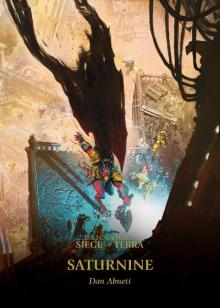 Saturnine
Saturnine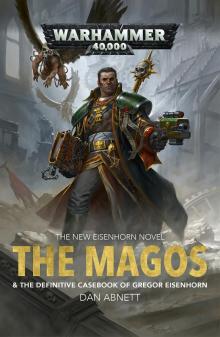 The Magos
The Magos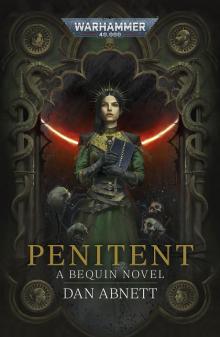 Penitent
Penitent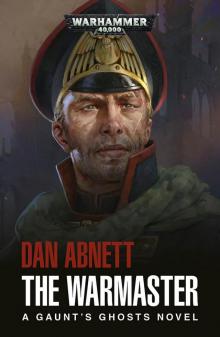 THE WARMASTER
THE WARMASTER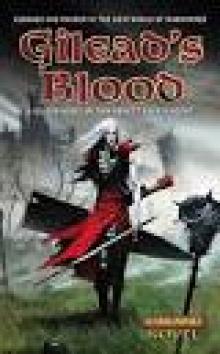 Gilead's Blood
Gilead's Blood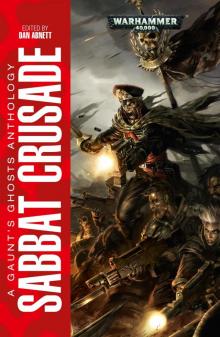 Sabbat Crusade
Sabbat Crusade![[Warhammer 40K] - Double Eagle Read online](http://i1.bookreadfree.com/i/03/16/[warhammer_40k]_-_double_eagle_preview.jpg) [Warhammer 40K] - Double Eagle
[Warhammer 40K] - Double Eagle![[Gaunt's Ghosts 02] - Ghostmaker Read online](http://i1.bookreadfree.com/i/03/16/[gaunts_ghosts_02]_-_ghostmaker_preview.jpg) [Gaunt's Ghosts 02] - Ghostmaker
[Gaunt's Ghosts 02] - Ghostmaker![[Gaunt's Ghosts 10] - The Armour of Contempt Read online](http://i1.bookreadfree.com/i/03/16/[gaunts_ghosts_10]_-_the_armour_of_contempt_preview.jpg) [Gaunt's Ghosts 10] - The Armour of Contempt
[Gaunt's Ghosts 10] - The Armour of Contempt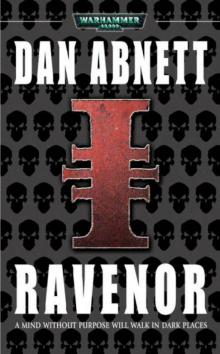 Ravenor
Ravenor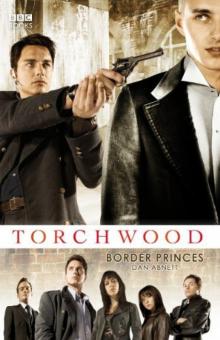 Border Princes
Border Princes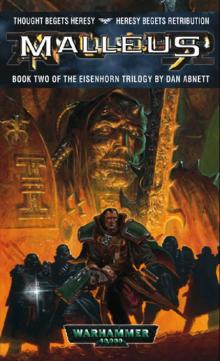 Warhammer - Eisenhorn 02 - Malleus (Abnett, Dan)
Warhammer - Eisenhorn 02 - Malleus (Abnett, Dan)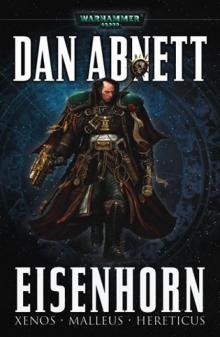 Eisenhorn Omnibus
Eisenhorn Omnibus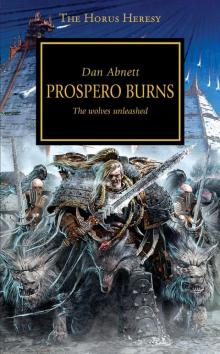 Prospero Burns
Prospero Burns The Story of Martha
The Story of Martha Extinction Event
Extinction Event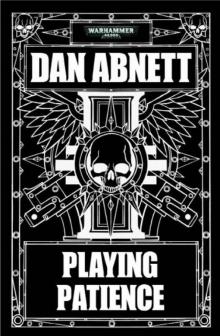 Playing Patience
Playing Patience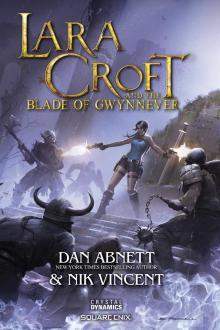 Lara Croft and the Blade of Gwynnever
Lara Croft and the Blade of Gwynnever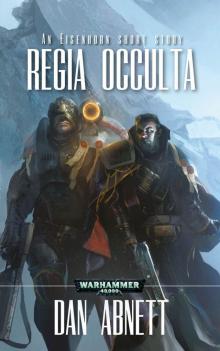 Regia Occulta
Regia Occulta![[Gaunt's Ghosts] - The Iron Star Read online](http://i1.bookreadfree.com/i/03/13/[gaunts_ghosts]_-_the_iron_star_preview.jpg) [Gaunt's Ghosts] - The Iron Star
[Gaunt's Ghosts] - The Iron Star![[Warhammer] - Fell Cargo Read online](http://i1.bookreadfree.com/i/03/13/[warhammer]_-_fell_cargo_preview.jpg) [Warhammer] - Fell Cargo
[Warhammer] - Fell Cargo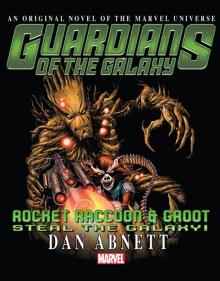 GUARDIANS OF THE GALAXY: ROCKET RACCOON & GROOT STEAL THE GALAXY!
GUARDIANS OF THE GALAXY: ROCKET RACCOON & GROOT STEAL THE GALAXY!![[Ravenor 01] Ravenor - Dan Abnett Read online](http://i1.bookreadfree.com/i/03/20/[ravenor_01]_ravenor_-_dan_abnett_preview.jpg) [Ravenor 01] Ravenor - Dan Abnett
[Ravenor 01] Ravenor - Dan Abnett![[Gaunt's Ghosts 06] - Straight Silver Read online](http://i1.bookreadfree.com/i/03/17/[gaunts_ghosts_06]_-_straight_silver_preview.jpg) [Gaunt's Ghosts 06] - Straight Silver
[Gaunt's Ghosts 06] - Straight Silver![[Ravenor 02] Ravenor Returned - Dan Abnett Read online](http://i1.bookreadfree.com/i/03/20/[ravenor_02]_ravenor_returned_-_dan_abnett_preview.jpg) [Ravenor 02] Ravenor Returned - Dan Abnett
[Ravenor 02] Ravenor Returned - Dan Abnett![[Gaunt's Ghosts 08] - Traitor General Read online](http://i1.bookreadfree.com/i/03/14/[gaunts_ghosts_08]_-_traitor_general_preview.jpg) [Gaunt's Ghosts 08] - Traitor General
[Gaunt's Ghosts 08] - Traitor General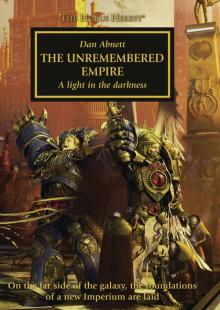 The Unremembered Empire
The Unremembered Empire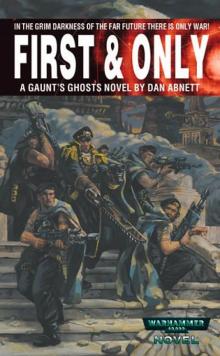 First and Only
First and Only![[Darkblade 05] - Lord of Ruin Read online](http://i1.bookreadfree.com/i/03/15/[darkblade_05]_-_lord_of_ruin_preview.jpg) [Darkblade 05] - Lord of Ruin
[Darkblade 05] - Lord of Ruin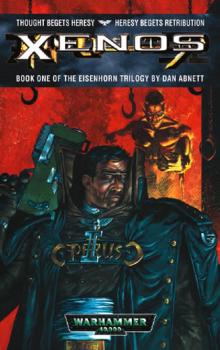 Warhammer - Eisenhorn 01 - Xenos (Abnett, Dan)
Warhammer - Eisenhorn 01 - Xenos (Abnett, Dan) Meduson
Meduson The Fall of Malvolion
The Fall of Malvolion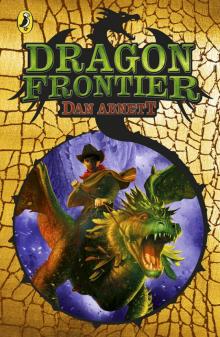 Dragon Frontier
Dragon Frontier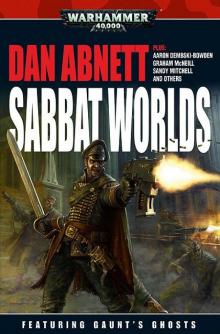 Sabbat Worlds
Sabbat Worlds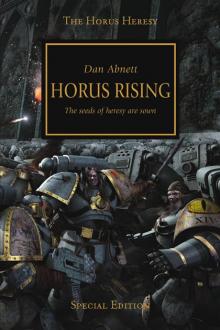 Horus Rising
Horus Rising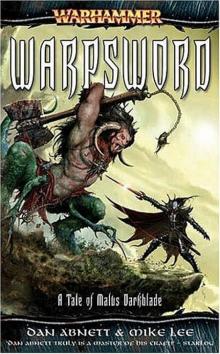 Warhammer - Darkblade 04 - Warpsword
Warhammer - Darkblade 04 - Warpsword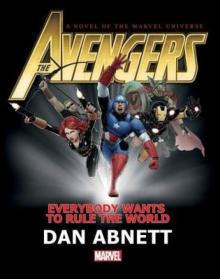 Avengers_Everybody Wants to Rule the World_Marvel Comics Prose
Avengers_Everybody Wants to Rule the World_Marvel Comics Prose![[Gaunt's Ghosts 04] - Honour Guard Read online](http://i1.bookreadfree.com/i/03/16/[gaunts_ghosts_04]_-_honour_guard_preview.jpg) [Gaunt's Ghosts 04] - Honour Guard
[Gaunt's Ghosts 04] - Honour Guard![[Darkblade 04] - Warpsword Read online](http://i1.bookreadfree.com/i/03/16/[darkblade_04]_-_warpsword_preview.jpg) [Darkblade 04] - Warpsword
[Darkblade 04] - Warpsword![[Gaunt's Ghosts 11] - Only in Death Read online](http://i1.bookreadfree.com/i/03/16/[gaunts_ghosts_11]_-_only_in_death_preview.jpg) [Gaunt's Ghosts 11] - Only in Death
[Gaunt's Ghosts 11] - Only in Death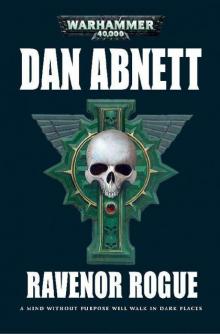 Ravenor Rogue
Ravenor Rogue![[Ravenor 03] Ravenor Rogue - Dan Abnett Read online](http://i1.bookreadfree.com/i/03/16/[ravenor_03]_ravenor_rogue_-_dan_abnett_preview.jpg) [Ravenor 03] Ravenor Rogue - Dan Abnett
[Ravenor 03] Ravenor Rogue - Dan Abnett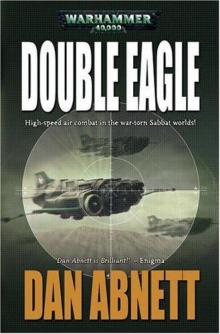 Double Eagle
Double Eagle Doctor Who - The Silent Stars Go By
Doctor Who - The Silent Stars Go By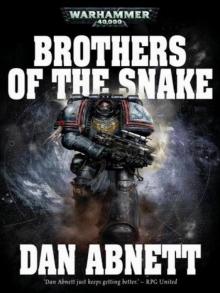 Brothers of the Snake
Brothers of the Snake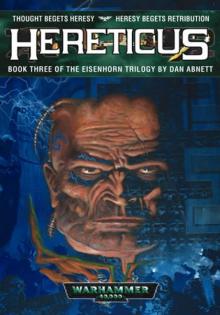 Warhammer - Eisenhorn 03 - Hereticus (Abnett, Dan)
Warhammer - Eisenhorn 03 - Hereticus (Abnett, Dan)![[Darkblade 03] - Reaper of Souls Read online](http://i1.bookreadfree.com/i/03/16/[darkblade_03]_-_reaper_of_souls_preview.jpg) [Darkblade 03] - Reaper of Souls
[Darkblade 03] - Reaper of Souls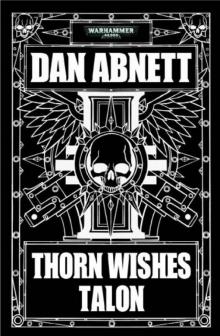 Thorn Wishes Talon
Thorn Wishes Talon Doctor Who
Doctor Who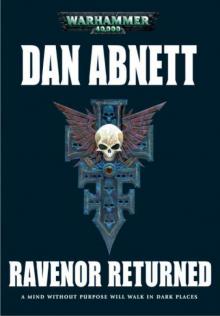 Ravenor Returned
Ravenor Returned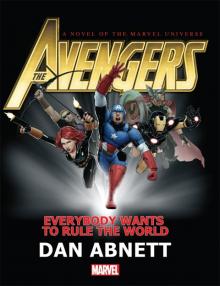 Avengers: Everybody Wants to Rule the World
Avengers: Everybody Wants to Rule the World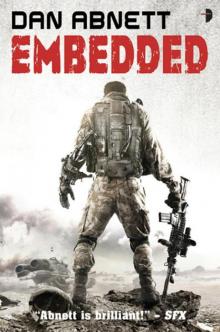 Embedded
Embedded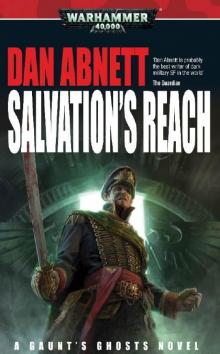 Salvation's Reach
Salvation's Reach![[Gaunt's Ghosts 03] - Necropolis Read online](http://i1.bookreadfree.com/i/03/19/[gaunts_ghosts_03]_-_necropolis_preview.jpg) [Gaunt's Ghosts 03] - Necropolis
[Gaunt's Ghosts 03] - Necropolis![[Darkblade 01] - The Daemon's Curse Read online](http://i1.bookreadfree.com/i/03/17/[darkblade_01]_-_the_daemons_curse_preview.jpg) [Darkblade 01] - The Daemon's Curse
[Darkblade 01] - The Daemon's Curse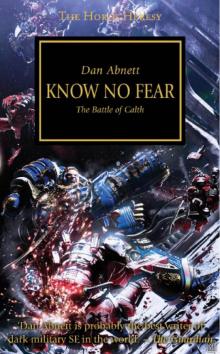 Know No Fear
Know No Fear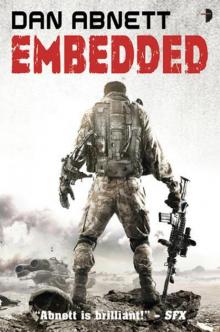 Dan Abnett - Embedded
Dan Abnett - Embedded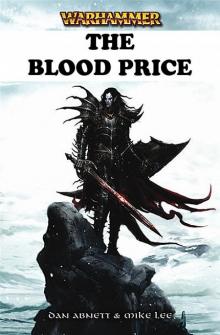 00.1 - The Blood Price
00.1 - The Blood Price![[Warhammer 40K] - Sabbat Worlds Read online](http://i1.bookreadfree.com/i/03/17/[warhammer_40k]_-_sabbat_worlds_preview.jpg) [Warhammer 40K] - Sabbat Worlds
[Warhammer 40K] - Sabbat Worlds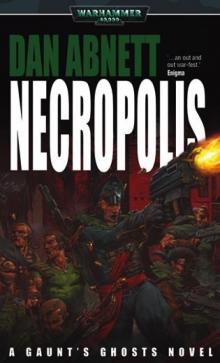 Necropolis
Necropolis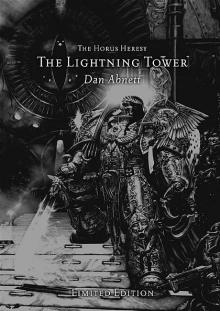 The Lightning Tower & The Dark King
The Lightning Tower & The Dark King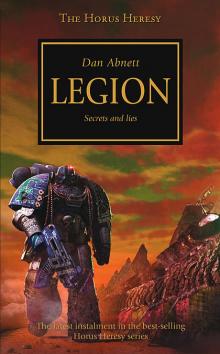 Legion
Legion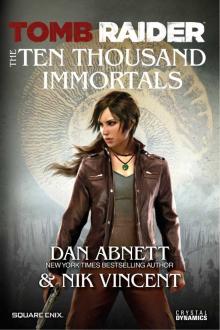 Tomb Raider: The Ten Thousand Immortals
Tomb Raider: The Ten Thousand Immortals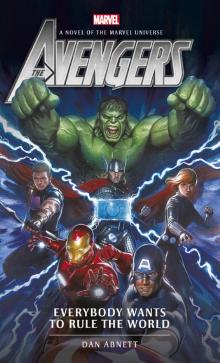 Avengers
Avengers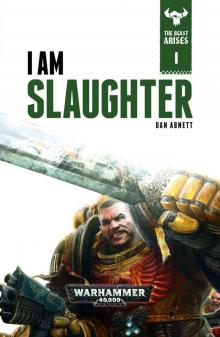 I am Slaughter
I am Slaughter![[Gaunt's Ghosts 07] - Sabbat Martyr Read online](http://i1.bookreadfree.com/i1/04/02/[gaunts_ghosts_07]_-_sabbat_martyr_preview.jpg) [Gaunt's Ghosts 07] - Sabbat Martyr
[Gaunt's Ghosts 07] - Sabbat Martyr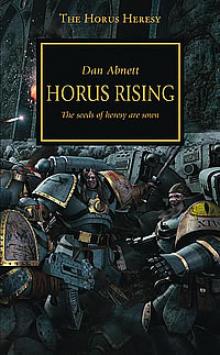 The Horus Heresy: Horus Rising
The Horus Heresy: Horus Rising![[Gaunt's Ghosts 01] - First & Only Read online](http://i1.bookreadfree.com/i1/04/02/[gaunts_ghosts_01]_-_first_&_only_preview.jpg) [Gaunt's Ghosts 01] - First & Only
[Gaunt's Ghosts 01] - First & Only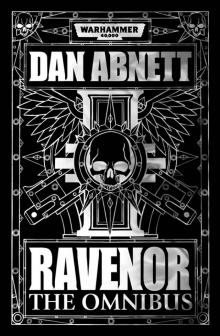 Ravenor Omnibus
Ravenor Omnibus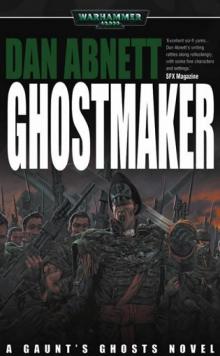 Ghostmaker
Ghostmaker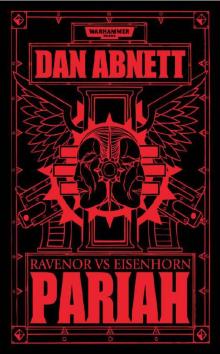 Pariah: Eisenhorn vs Ravenor
Pariah: Eisenhorn vs Ravenor![[Gaunt's Ghosts 12] - Blood Pact Read online](http://i1.bookreadfree.com/i1/04/04/[gaunts_ghosts_12]_-_blood_pact_preview.jpg) [Gaunt's Ghosts 12] - Blood Pact
[Gaunt's Ghosts 12] - Blood Pact![[Gaunt's Ghosts 05] - The Guns of Tanith Read online](http://i1.bookreadfree.com/i1/04/01/[gaunts_ghosts_05]_-_the_guns_of_tanith_preview.jpg) [Gaunt's Ghosts 05] - The Guns of Tanith
[Gaunt's Ghosts 05] - The Guns of Tanith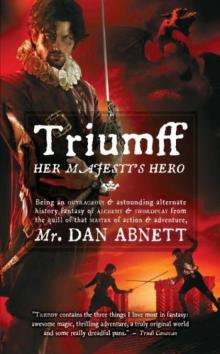 Triumff: Her Majesty's Hero
Triumff: Her Majesty's Hero![[Gaunt's Ghosts 09] - His Last Command Read online](http://i1.bookreadfree.com/i1/04/02/[gaunts_ghosts_09]_-_his_last_command_preview.jpg) [Gaunt's Ghosts 09] - His Last Command
[Gaunt's Ghosts 09] - His Last Command![[Darkblade 00.1] - The Blood Price Read online](http://i1.bookreadfree.com/i2/04/03/[darkblade_00_1]_-_the_blood_price_preview.jpg) [Darkblade 00.1] - The Blood Price
[Darkblade 00.1] - The Blood Price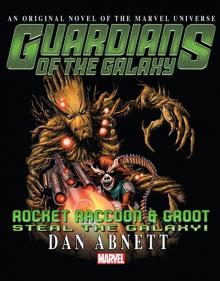 Guardians of the Galaxy: Rocket Raccoon and Groot - Steal the Galaxy!
Guardians of the Galaxy: Rocket Raccoon and Groot - Steal the Galaxy!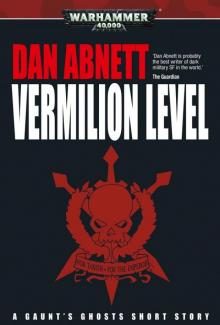 Vermilion Level
Vermilion Level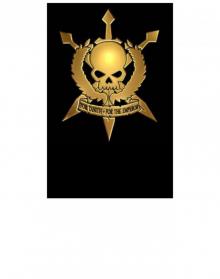 In Remembrance
In Remembrance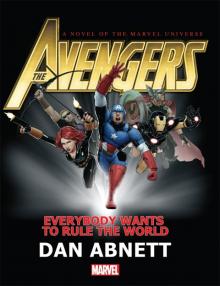 The Avengers: Everybody Wants to Rule the World
The Avengers: Everybody Wants to Rule the World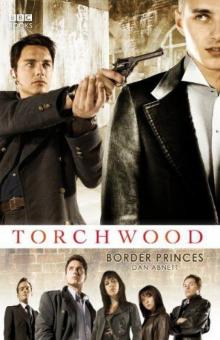 Border Princes t-2
Border Princes t-2![[Darkblade 02] - Bloodstorm Read online](http://i1.bookreadfree.com/i2/04/07/darkblade_02_-_bloodstorm_preview.jpg) [Darkblade 02] - Bloodstorm
[Darkblade 02] - Bloodstorm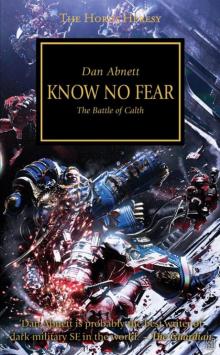 Know no fear. The Battle of Calth hh-19
Know no fear. The Battle of Calth hh-19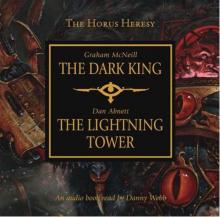 The Dark King and The Lightning Tower
The Dark King and The Lightning Tower